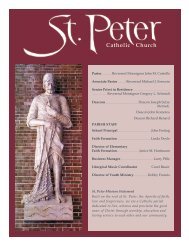TheFaithful Woman - Flocknote
TheFaithful Woman - Flocknote
TheFaithful Woman - Flocknote
You also want an ePaper? Increase the reach of your titles
YUMPU automatically turns print PDFs into web optimized ePapers that Google loves.
❃<br />
The Faithful <strong>Woman</strong><br />
A Newsletter for Fidelis Volunteers<br />
December 2012<br />
The Beauty of a Virtuous <strong>Woman</strong>’s Heart<br />
by Robert Wenderski<br />
Thanks to Ignatius Press for the following<br />
article.<br />
Men are indebted to women. A<br />
virtuous woman’ is immediately<br />
attractive. In response to this virtue,<br />
men desire to praise, honor, encourage,<br />
and cultivate virtue in the woman so<br />
possessing it. This is absolutely basic to<br />
the affection between men and women.<br />
When a man seeks a woman’s<br />
affection, he is a debtor. He has done<br />
nothing other than what he desires<br />
to do; it is the virtuous woman who<br />
has accomplished the difficult task of<br />
acquiring virtue. When a woman who<br />
has reached the heights of virtue by selfdenial<br />
gives her affection to a man—a<br />
man who has done nothing to clothe his<br />
beloved in virtue—he is a debtor, seeing<br />
sin in himself against the virtues of his<br />
beloved.<br />
Necessity of Women to<br />
Practice Virtue<br />
classic definition of love, given by<br />
A St. Thomas Aquinas, states that:<br />
“To love is to will the good of another.” 1<br />
This definition says nothing about the<br />
lover, but rather focuses on the beloved.<br />
It clearly defines that love is in the will:<br />
“Love [is] sustained choice,” 2 and not<br />
founded in the emotions. And it specifically<br />
defines love as having as its object<br />
the serving of another person (since<br />
only persons–whether human, angelic,<br />
or divine–have a free will, only persons<br />
can love; hence, the “other” can only be<br />
another person). 3<br />
It is the nature of love to give, to<br />
give completely and entirely. The lover<br />
does not say to his beloved: “I will love<br />
for seven months.” Rather, he says:<br />
“I will love you forever.” The Second<br />
Vatican Council teaches that the human<br />
person can be fulfilled “only in a<br />
sincere giving” 4 of the self. For example,<br />
“<strong>Woman</strong>’s unhappiest moments are<br />
when she is unable to give; her most<br />
hellish moments are when she refuses to<br />
give.” 5<br />
To prompt this self-giving desire in<br />
men [as opposed to instigating lustful<br />
desires, born of selfishness], women<br />
must cultivate the practice of those<br />
virtues more particular to their nature.<br />
That is, to be true to the vocation of<br />
woman, virtues that demonstrate a giving<br />
of self must be displayed.<br />
To attain to the true vocation of<br />
woman is not the same thing as “being<br />
oneself.” In fact, it is precisely the<br />
opposite. The “seven pallbearers of<br />
character” 6 —the seven capital sins—<br />
must be overcome. The sisters of the<br />
seven capital sins must also be overcome,<br />
that is, those faults more “natural”<br />
to women than men: jealousy, faultfinding,<br />
gossiping, sensitivity to the<br />
opinions of others. It is worth noting<br />
that the faults to which women are often<br />
most subject are related to persons,<br />
not related to things. This is expected,<br />
because women are closer to persons<br />
(whereas men are closer to things). 7<br />
Similarly, the virtues women<br />
must cultivate are related to persons:<br />
understanding, sensitivity, creativity, 8<br />
acceptance, resignation, submission, 9<br />
intuitiveness, generosity, fidelity, 10<br />
receptiveness, 11 and equity. 12 Pope<br />
John Paul II writes that the virtues of<br />
women must correspond to the nature<br />
of women, which is constituted in such<br />
a way that each woman’s mission is “to<br />
welcome [and] to care for the human<br />
person.” 13 In another place, the Holy<br />
Father writes of the “naturally spousal<br />
predisposition of the feminine personality.”<br />
14<br />
The gifts of femininity have long<br />
been amply praised in former times<br />
for their uplifting effect on humanity.<br />
No less than fourteen beautiful female<br />
figures depict the seven sacred sciences<br />
and the seven liberal arts in the left wall<br />
of Andrea di Bonaiuto’s Spanish Chapel<br />
in the Dominican Church of St. Maria<br />
Novella in Florence. The feminine<br />
gifts of prudence and religion prompt<br />
Raphael in the Hall of Constantine and<br />
the gift of faith prompts Podesti in the<br />
Room of the Immaculate Conception<br />
to portray these and other virtues by<br />
a female personage. It is perhaps the<br />
humility of women, which makes their<br />
voices nearly angelic, which inspires<br />
Faure in his Requiem Mass to direct<br />
❃
female voices to convey the joy of the<br />
glorious In Paradisum immediately after<br />
the male tenor voice dominates the<br />
travail of the Libera me. Homer extols<br />
the forbearance and fidelity of Penelope<br />
when Ulysses is away at war, and Fra<br />
Bartomeleo paints a compassionate St.<br />
Mary Magdalene as embracing Our<br />
Lord’s feet in his “Pieta.” Archbishop<br />
Fulton Sheen observes:<br />
The level of any civilization<br />
is the level of its womanhood.<br />
The reason is to be found in the<br />
difference between knowing and<br />
loving. When we know something,<br />
we bring it down to the<br />
level of our intelligence. Examples<br />
of abstract subjects must be<br />
given to children to suit the level<br />
of their minds. But when we<br />
love something, we always have<br />
to go up to meet it. For example,<br />
if we want to master music, we<br />
must obey its laws and meet<br />
its demands. Since a woman is<br />
loved, it follows that the nobler<br />
a woman is, the nobler man will<br />
have to be to be deserving of<br />
that love. That is why the level<br />
of any civilization is always the<br />
level of its womanhood. 15<br />
When men, assisted by grace,<br />
recognize the excellence of femininity by<br />
encouragement and praise of feminine<br />
virtues, women will teach men how to<br />
love. Civilization will be raised from the<br />
depth of selfishness and despair to the<br />
height of selflessness and hope<br />
What is the essence or foundation<br />
of a woman’s virtue? We have stated that<br />
her virtues are related to persons. Pope<br />
John Paul II brilliantly summarizes the<br />
nature of feminine virtue, and simultaneously<br />
explains why such virtue is so<br />
heartwarming, when he writes:<br />
Our time in particular awaits<br />
the manifestation of that ‘genius’<br />
which belongs to women, and<br />
which can ensure sensitivity for human<br />
beings in every circumstance. 16<br />
Necessary emphasis should be<br />
placed on the ‘genius of women,’<br />
➺ 2➺<br />
not only by considering great and<br />
famous women of the past or present,<br />
but also those ordinary women<br />
who reveal the gift of their womanhood<br />
by placing themselves at the<br />
service of others in their everyday<br />
lives. 17<br />
Vocation of <strong>Woman</strong><br />
What is the vocation of woman?<br />
According to Pope John Paul II,<br />
a woman by her very nature is called to<br />
manifest the truth to everyone of the<br />
existence and depth of the love “with<br />
which every human being—man and<br />
woman—is loved by God in Christ.” 18<br />
The Holy Father also writes: “Thank<br />
you, every woman, for the simple fact<br />
of being a woman! Through the insight<br />
which is so much a part of your<br />
womanhood you enrich the world’s<br />
understanding and help to make human<br />
relations more honest and authentic.” 19<br />
Dr. Alice von Hildebrand quotes St.<br />
Edith Stein: “. . . the particular mission<br />
of women is to protect, to preserve, to<br />
shelter, to guard, to bring warmth in a<br />
cold, icy universe. In other words, to be<br />
maternal.” 20 It is perhaps for all these<br />
reasons that Pope Pius XI wrote: “For if<br />
the man is the head[of the family], the<br />
woman is the heart, and as he occupies<br />
the chief place in ruling, so she may and<br />
ought to claim for herself the chief place<br />
in love.” 21<br />
Truth, Beauty, and Goodness<br />
are Integrally Related<br />
Women faithful to their true vocation<br />
attain beauty. This beauty is<br />
interior and spiritual, and displays itself<br />
in the deportment and countenance<br />
of women. St. Thomas Aquinas gives<br />
three characteristics of beauty: radiance<br />
(claritas), harmony or due proportion<br />
(consonantia or debita proportio), and<br />
wholeness (integritas). 22<br />
Radiance<br />
Interior virtue has an exterior manifestation.<br />
Beautiful things shine23 —in<br />
a virtuous women’s actions, of course,<br />
in her smile, but also, as noted above,<br />
simply in her countenance. Speaking of<br />
Blessed Fra Angelico’s altarpiece in the<br />
Dominican Monastery of San Marco in<br />
Florence, Professor Saward notes: ”...<br />
in Angelico’s Madonna, the fairness of<br />
her soul, the substantial form, shines<br />
through the fineness of her features.” 24<br />
Harmony<br />
Singing the virtues of the Mother of<br />
God, St. Albert the Great wrote:<br />
“‘All fair art thou,’ that is, in body and<br />
in soul: in body, through the integrity<br />
of in-corruption and the unimpaired<br />
purity of all the senses; in the soul, not<br />
only all fair through humility, but very<br />
beautiful, most beautiful, through the<br />
perfect plenitude of all the virtues.” 25<br />
Wholeness<br />
Wholeness indicates nothing deficient<br />
or lacking; nothing extraneous<br />
or superfluous. Again, with Holy<br />
Mary as an example, we have wholeness<br />
unlike any other creature: she is Virgin<br />
and Mother; Daughter, Mother, and<br />
Spouse; a human person yet without<br />
sin; a Handmaid yet a Queen; humble<br />
yet exalted; a creature yet Queen of<br />
Angels. In her did the Son, whom the<br />
heavens cannot contain, dwell for nine<br />
months. Through her did salvation,<br />
in the Divine Person of Jesus, come<br />
to men. She, Iota pulchra, is entirely,<br />
wholly, completely the person whom<br />
the Holy Trinity desires her to be.<br />
To attain goodness, through a<br />
virtuous life, is the purpose for which all<br />
human beings, men and women, were<br />
made. Beauty is “the radiance of the one<br />
and the true and the good.” 26 Beauty<br />
is also the “splendor of truth.” 27 The<br />
Source of unity and truth and goodness<br />
is the Holy Trinity, and holiness in<br />
creatures is attained “essentially by the<br />
possession of divine grace and morally<br />
by the practice of virtue.” 28 Sanctifying<br />
grace is the created effect of the indwelling<br />
of the Holy Spirit. Therefore, we can<br />
understand that, in creatures, holiness<br />
produces beauty.
Influence of Virtuous Women on<br />
Men: Men Attempt to be Worthy<br />
of a Virtuous <strong>Woman</strong>’s Love<br />
Men know they cannot be worthy<br />
of the love of a virtuous woman’s<br />
heart. Men, too susceptible to pride and<br />
lust, cannot fathom the gentleness of a<br />
woman’s heart. Men are often too ambitious<br />
for worldly ac claim and worldly<br />
things to focus on each person as a gift.<br />
Men frequently need a multiplicity of<br />
reasons to love, and cannot understand<br />
the simplicity with which women love<br />
the person as one who is “created for<br />
love.” 29 Men simply do not have the<br />
same relation to persons that women do.<br />
Indeed, God “entrusts the human being<br />
to her in a special way.” 30<br />
Despite this unworthiness, a man<br />
wishes to entrust himself to a woman.<br />
Men desire to be awed twice over: once,<br />
because of the life-giving ability of the<br />
woman, and second, by a selfless heart<br />
which, to his astonishment and for reasons<br />
he cannot understand, might give<br />
itself to a sinful man. 31 Consequently,<br />
he develops the desire to serve this<br />
generous woman purely to please the<br />
beloved. Physical appearance may make<br />
a woman temporarily attractive, but it<br />
is beauty f heart that makes a woman<br />
irresistible. 32<br />
“We love anyone only in the measure<br />
that our minds tell us how good<br />
that person is.” 33 This is especially true<br />
for men, since they emphasize the rational,<br />
thinking dimension of the soul,<br />
whereas women emphasize the affective<br />
dimension of the soul. For this reason,<br />
women who engage in the marriage act<br />
outside of or before marriage receive<br />
no honor from men. Such conduct<br />
instructs men that a woman places her<br />
sensible appetites above her heart, which<br />
is another way of defining selfishness. 34<br />
In contrst, a virtuous woman offers<br />
men the opportunity—or rather,<br />
actually prompts the desire—to praise,<br />
honor, and cultivate her virtues. Why?<br />
To attempt to be worthy of a woman’s<br />
love and affection. While men know<br />
➺ 3➺<br />
this worthiness is unattainable, men<br />
must prove their love for the beloved<br />
by acts of love. Men must demonstrate<br />
their love; otherwise it dies. And, by<br />
a marvelous ordaining of Most Holy<br />
Trinity (the perfect Communion of<br />
Persons):<br />
One desires the good of the other<br />
because he or she is recognized as worthy<br />
of being loved. This is a love which<br />
generates communion between persons,<br />
because each considers the good of the<br />
other as his or her own good. 35<br />
The virtue of a woman transforms<br />
a man to conclude that pleasing the beloved<br />
is equally or more important than<br />
pleasing himself.<br />
The reason men are in awe of a virtuous<br />
woman who returns his affection<br />
is that the man’s dignity as a child of<br />
God is affirmed! Some would claim that<br />
the basic desire of human beings is to be<br />
loved. Not so. When the soul is elevated<br />
by the supernatural grace of charity,<br />
the person is to desire to “love God<br />
above all things for his own sake, and<br />
our neighbor as ourselves for the love<br />
of God.” 36 Charity is the supernatural<br />
ability ”. . . to practice the virtue of selfless<br />
love of others, which is the principal<br />
way we show our love for God.” 37<br />
When the charity practiced by a man is<br />
returned by the affectionate charity of<br />
a virtuous woman, the man’s desire to<br />
practice charity further is affirmed. And<br />
it is greatly strengthened.<br />
This selfless love is not poetry or<br />
some unattainable ideal. This charity<br />
is at once ontological, and the effect of<br />
supernatural grace on the mind and will<br />
of men. “To say that man is created in<br />
the image and likeness of God means<br />
that man is called to exist ‘for’ others, to<br />
become a gift.” 38 When a man, in a state<br />
of grace, attempts to be worthy of a<br />
woman’s love, the attempt is also to offer<br />
himself as a gift to that woman. Thus,<br />
“this ‘new heart’ [Ezek 36:25-26 and Jer<br />
31:34] will make it possible to appreciate<br />
and achieve the deepest and most<br />
authentic meaning of life: namely, that<br />
of being a gift which is fully realized in<br />
the giving of self.” 39<br />
Love as Sacrifice and Service<br />
But the virtue of a woman must<br />
provide the “incentive” to engender<br />
this gift of self by man. It is a women’s<br />
virtue which must provide the incentive<br />
to a man to die, if necessary, willingly,<br />
joyfully, to defend his spouse. Her social<br />
standing, material wealth, physical appearance,<br />
or any other temporal characteristic<br />
will not provide this incentive.<br />
A man’s self-love is too strong to permit<br />
him to die for his spouse on his own. A<br />
woman’s selfless love must inspire a heroic<br />
self-sacrifice. A man will not make<br />
the sacrifice of himself for his spouse<br />
unless he has previously died to self<br />
daily, in a thousand acts of charity, all<br />
in order to please the beloved. And the<br />
heart of a virtuous woman is, in man’s<br />
estimation, worth dying for. Why?<br />
Because dying for the beloved is the<br />
ultimate act of charity40 —the ultimate<br />
way in which man proves his love for his<br />
beloved.<br />
God, through St. Paul, commands<br />
husbands “to love your wives as Christ<br />
also loved the Church. . .” (Eph 5:25a).<br />
Sacred Scripture immediately explains<br />
how this is demonstrated, since Christ<br />
“delivered himself up for it” (Eph<br />
5:25b). As Jesus deemed the Church<br />
worthy enough to die for, so a man<br />
must deem his beloved worthy enough<br />
to die for.<br />
The Church often speaks of the<br />
nature of married love as a mutual<br />
sell-giving of the spouses. 41 From a<br />
philosophical perspective grounded<br />
in the inherent dignity of the person,<br />
Wojtyla writes: “If marriage is to satisfy<br />
the demands of the personalistic norm<br />
it must embody reciprocal self-giving, a<br />
mutual betrothed love.” 42 Dr. Dietrich<br />
von Hildebrand writes: “. . . the two<br />
partners give themselves expressly to<br />
each other. . .” 43 This mutual self-giving,<br />
especially on the man’s part, is born of<br />
a mutual desire to serve the beloved, in<br />
order to please the beloved.
Joys a Virtuous Women Gives<br />
The interior beauty of virtuous<br />
woman manifests itself in her<br />
countenance, her deportment, and<br />
above all, in her actions, and these three<br />
expressions can be summed up in the<br />
word “heart.” When true to her vocation,<br />
a woman must clothe her body but<br />
reveal her heart. When that vocation is<br />
to the religious life, the heart is often<br />
revealed to the Divine Spouse gradually,<br />
due to perceived unworthiness when<br />
compared to the Sacred Heart. When<br />
perfected, a bride of Christ gladly and<br />
entirely reveals her heart to Jesus. When<br />
that vocation is to the married life, a<br />
woman must at first reveal her heart<br />
gradually, this time because mortal<br />
man cannot grasp the brightness of a<br />
virtuous woman’s heart all at once. The<br />
man is fearful of learning of too great a<br />
secret before he has acquired the needed<br />
virtues himself to be entrusted with the<br />
glorious gift of a woman’s heart. Women<br />
must reveal their sweetness slowly.<br />
Men desire to rest in the heart of<br />
their beloved in an embrace. This rest is<br />
unlike any other natural rest, because it<br />
is founded on trust. And trust demonstrates<br />
honor. Through this embrace<br />
man perceives his temporal completeness–all<br />
he lacks by lacking femininity is<br />
provided by the heart of the women he<br />
wishes to serve. A virtuous woman, in<br />
loving a man who knows himself a sinner,<br />
also fosters humility in the man.<br />
Another joy a virtuous woman affords<br />
a man is to serve a beloved daughter<br />
of the Eternal Father. In the Old<br />
Testament, we read the words of Boaz to<br />
the Moabite woman Ruth:<br />
Blessed art thou of the Lord . . . For<br />
all the people that dwell within the gates<br />
of my city know that thou art a virtuous<br />
woman. (Ruth 3:10-11)<br />
And another joy given by a virtuous<br />
woman to her beloved is the calming effect<br />
he receives. A virtuous woman does<br />
not try to make herself attractive so as<br />
to arouse physical desire in men. Rather,<br />
the modesty of a woman is immediately<br />
engaging. It is a form of gentleness.<br />
➺ 4➺<br />
In her modesty, she shows a greater<br />
concern for the state of soul, both hers<br />
and her beloved’s, than for ornamentation<br />
of the body, which appeals to men<br />
because it demonstrates her value of the<br />
entire person. 44 The message of immodest<br />
dress is one of indulgence, of passion<br />
that is known to be fleeting and which<br />
leaves emptiness as its fruit. Far more<br />
attractive is the woman who conceals<br />
her feminine mystery, revealing it only<br />
as a man proves trustful. This revelation<br />
is understood by man as a reward for his<br />
trust.<br />
Another spiritual benefit received<br />
from a virtuous woman is that man receives<br />
a great joy from serving a woman<br />
who provides the stability of love. Vice<br />
results in uncertainty, a great danger in a<br />
man’s mind. How the rational faculty in<br />
the male leads him to seek certainty and<br />
dread uncertainty!<br />
Specific Acts of Virtue to Practice<br />
few applications are in order. Grace<br />
A precedes virtue; therefore, men and<br />
women must seek grace for themselves<br />
in the four ways the Church has taught:<br />
prayer, fruitful reception of the Holy<br />
Sacraments, the practice of living a virtuous<br />
life, and patience in suffering.<br />
Avoiding occasions of sin, especially<br />
in our day, is a necessary step to achieving<br />
holiness.<br />
Since Jesus is the Source of all<br />
beauty, we must become more like<br />
Him. 45 This cannot be done by the natural<br />
power available to human nature.<br />
Consequently, we must avail ourselves<br />
of the Holy Sacraments, but especially<br />
of the triple sacrament of the Most Holy<br />
Eucharist:<br />
• We must visit Jesus in the Most<br />
Blessed Sacrament of the Altar.<br />
• We must receive Holy Communion<br />
with great reverence.<br />
• Most importantly, we must<br />
unite ourselves with Jesus in<br />
the Most Holy Sacrifice of<br />
the Mass, wherein He offers<br />
Himself again, mystically, to<br />
the Eternal Father, and includes<br />
the whole Church in His offer-<br />
ing. The Holy Sacrifice of the<br />
Mass affords a primary grace of<br />
self-surrender, 46 which is vital<br />
to men, who are called to love<br />
their wives “as Christ loved the<br />
Church.”<br />
Men must continually make this<br />
offering of themselves, with Jesus, in the<br />
Holy Sacrifice of the Mass. In this way,<br />
they will prepare to die to themselves<br />
daily, in a multitude of acts of charity, to<br />
please their spouse.<br />
Conclusion<br />
May we have constant recourse to<br />
her who is tota pulchra, in whom<br />
the Divine Child, the Source of all<br />
Beauty, Truth, and Goodness, dwelt for<br />
nine months. By imitation of the virtues<br />
of Holy Mary and through the intercession<br />
of her prayers, may we experience<br />
the joy of her Sweetest Heart by always<br />
pleasing her Divine Son.<br />
Robert Wenderski is a free lance<br />
writer from Detroit, Michigan.<br />
Endnotes<br />
1 Catechism of the Catholic Church, 1994,<br />
paragraph 1776.<br />
2 Fr. John A. Hardon, S.J., ”The Morality<br />
of Sex Stimuli,” Side 1.<br />
3 Cf Karol Wojtyla, Love and Responsibility,<br />
Ignatius Press, 1993, tr. by H.T. Willetts, p. 29.<br />
In context, while not denying to angelic or to<br />
Divine Persons the ability to love, Wojtyla writes<br />
“Love is exclusively the portion of human persons”<br />
(emphasis in the original). cf. Apostolic Letter,<br />
Mulieris Dignitatem, August 15, 1988, no. 29.<br />
4 Gaudium et Spes, December 7, 1965, no.<br />
24.<br />
5 Fulton J. Sheen, The World’s First Love,<br />
McGraw-Hill Book Company, Inc., 1952, p. 81.<br />
6 Fulton J. Sheen, Lift Up Your Heart,<br />
McGraw-Hill Book Company, Inc., 1950, pp.<br />
89-102.<br />
7 For a clear and penetrating discussion of<br />
the differences between men and women, see<br />
Fulton J. Sheen’s The World’s First Love, Chapter<br />
6, “The Virgin Mother,” pp. 7585 and Chapter<br />
12, “Man and <strong>Woman</strong>,” pp. 147-159.<br />
8 Mulieris Dignitatem, nos. 15, 16, and 19.<br />
9 Sheen, The World’s First Love, p. 81.<br />
10 Pope John Paul II, ”Letter to Women,”<br />
June 29, 1995, no. 2.<br />
11 John Saward, The Beauty of Holiness and<br />
the Holiness of Beauty, Ignatius Press, 1997, p.<br />
135.<br />
12 Sheen, The World’s First Love, p. 187.<br />
13 General Audience, November 24, 1999.
14 Mulieris Dignitatem, no. 20.<br />
15 Life is Worth Living, Second Series,<br />
McGraw-Hill Book Company, Inc., 1954, p.<br />
173. Emphasis in the original. Pope John Paul<br />
II notes that “it is she who receives love, in order<br />
to love in return” Mulieris Dignitatem, no. 29.<br />
Emphasis in the original.<br />
16 Mulieris Dignitatem, no. 30. Emphasis<br />
in the original.<br />
17 Letter to Women, no. 12. Emphasis in the<br />
original.<br />
18 Mulieris Dignitatem, no. 29.<br />
19 Letter to Women, no. 2. Emphasis in the<br />
original.<br />
20 Conference entitled “The Privilege of<br />
Being a <strong>Woman</strong>,” given at the Human Life International<br />
World Conference on Love, Life, and<br />
the Family, 1997.<br />
21 Encyclical Casti Connubii, December<br />
31, 1930, no. 27.<br />
22 Saward, p. 43.<br />
23 Saward, p. 43.<br />
24 Saward, p. 44.<br />
25 Saward, p. 118, footnote no. 15, quoting<br />
De laudibus Sanctae Mariae; Beati Alberti<br />
Magni opera omnia, ed. A. Borgnet, vol 36 [Paris,<br />
1898], 274.<br />
26 Saward, p. 46.<br />
27 Saward, p. 114.<br />
28 Fr. John A. Hardon, S.J., Pocket Catholic<br />
Dictionary, An Image book published by Doubleday,<br />
1985, p. 177.<br />
29 Pontifical Council for the Family, The<br />
Truth and Meaning of Human Sexuality, December<br />
8, 1995, no. 8. Emphasis in the original.<br />
30 Mulieris Dignitatem, no. 30. Emphasis<br />
in the original.<br />
31 “For we must not forget that every true<br />
love possess an intrinsic spiritual fruitfulness and<br />
that conjugal love harbors this spiritual fruitfulness<br />
of love quite independently of procreation.”<br />
Dietrich von Hildebrand, Marriage, the Mystery<br />
of Faithful Love, Sophia Institute Press, 1997, p.<br />
30. Emphasis added.<br />
32 As St. Augustine says, “The basis of married<br />
love is the attachment of hearts.” Sheen, The<br />
World’s First Love, p. 87.<br />
33 Fr. John A. Hardon, S.J., “The Good<br />
Angels Glorify God and Serve as His Messengers<br />
to the Human Race,” Side 1. “Thou art all fair, 0<br />
my love, and there is not a spot in thee.” Canticle<br />
of Canticles 4:7.<br />
34 And selfishness, the antithesis of charity,<br />
opposes the good of the person. “To the degree<br />
that a person weakens chastity, his or her love becomes<br />
more and more selfish, that is, satisfying a<br />
desire for pleasure and no longer self-giving.” The<br />
Truth and Meaning of Human Sexuality, no. 16.<br />
35 The Truth and Meaning of Human Sexuality,<br />
no. 9.<br />
36 Catechism of the Catholic Church, paragraph<br />
1822.<br />
37 Fr. John A. Hardon, S.J., “The Most<br />
Blessed Sacrament and the Immaculate Heart of<br />
➺ 5➺<br />
Mary,” Side 2.<br />
38 Mulieris Dignitatem, no. 7.<br />
39 Pope John Paul II, Encyclical Evangelium<br />
Vitae, March 25, 1995, no. 49 Emphasis in<br />
the original.<br />
40 cf John 15:13.<br />
41 For example, Gaudium et Spes, no. 48,<br />
Humanae Vitae, no. 9, Familiaris Consortio, nos.<br />
11-14, Letter to Families, no. 11, and the Catechism<br />
of the Catholic Church, paragraph 2337.<br />
Especially noteworthy are the words of Pope<br />
Pius XI, writing of matrimony, which involves<br />
“the blending of life as a whole and the mutual<br />
interchange and sharing thereof” Casti Connubii,<br />
no. 24. Cf. no. 7.<br />
42 P. 99.<br />
43 PP. 21-22.<br />
44 “Sexual morality comes into being not<br />
only because persons are aware of the purpose of<br />
sexual life, but also because they are aware that<br />
they are persons. The whole moral problem of<br />
’using’ as the antithesis of love is connected with<br />
this knowledge of theirs.” Love and Responsibility,<br />
p. 33.<br />
45 A definition of holiness is ”Christ-likeness.<br />
” Fr. John A.<br />
Hardon, S.J., ”The Morality of Sex<br />
Stimuli,” Side 2.<br />
46 St. Peter Julian Eymard, founder of<br />
the Blessed Sacrament Fathers in 19th century<br />
France, advises: “The best method of participating<br />
in the Holy Sacrifice of the Mass is to unite<br />
oneself with the august Victim. Act, therefore,<br />
in union with Him, and with the same intention.<br />
United to the offering of Jesus Christ, your<br />
offering will be ennobled, purified, made worthy<br />
of God’s attention.” Holy Communion, Emmanuel<br />
Publications, translated by Clara Morris<br />
Rumball, pp. 32-33.<br />
© Robert Wenderski 2001<br />
This item 9576 digitally provided courtesy<br />
of CatholicCulture.org ✾
❃<br />
Movie Clip<br />
Clueless<br />
A US West Coast<br />
teen lifestyle parody<br />
centered around Cher, a<br />
popular high school girl<br />
who spends her days<br />
playing match-maker,<br />
helping her friends<br />
with fashion choices, and looking for<br />
a boyfriend. In this scene, Cher has an<br />
epiphany about her life and begins to<br />
transform herself from self absorbed<br />
beauty queen into a caring woman with<br />
concern for others’ needs.<br />
The King’s Message<br />
“Did you see…?”<br />
Did you see how instead of doing<br />
her usual routine to get someone to notice<br />
her, for example flashy clothes and<br />
flirty looks, all outward actions, Cher<br />
decided to improve her interior self?<br />
Did you notice she changed her heart,<br />
not her hairstyle?<br />
“It’s a lot like…”<br />
It’s a lot like when there is someone<br />
I want to impress, I jump through every<br />
hoop I can to get them to notice me.<br />
December 2<br />
The hopeful daughter has a daily conversion of heart.<br />
Sometimes it can be my boss, I try to<br />
find their interests so I can have things<br />
to say. Sometimes it’s a new friend, I<br />
try to dress like them, shop at the same<br />
stores. Other times it can be a guy, I<br />
become like a totally different person<br />
to try and fit myself into a relationship.<br />
But, when I do this, it’s just not me.<br />
People want to talk to me, not a clone<br />
of themselves. If I try to twist myself<br />
into an “image” all I am doing is setting<br />
myself up for disaster. I know now,<br />
real friends and real love is all about<br />
being “real.” When I am the best me, it<br />
attracts the best in others.<br />
“This is for you…”<br />
Sisters, no matter what you do or<br />
how you change your appearance, if it<br />
doesn’t match what is on the inside, it<br />
is just not going to matter. You have to<br />
work on your heart, your soul...improve<br />
your compassion, your generosity, your<br />
patience. Concentrate on serving others’<br />
needs, not so much on your own. Your<br />
virtue will be like a magnet, drawing<br />
people closer to you and towards God.<br />
Squad Time<br />
Pope Pius XI wrote: "For if the man is<br />
the head[of the family], the woman is the<br />
heart, and as he occupies the chief place in<br />
❃<br />
ruling, so she may and ought to claim for<br />
herself the chief place in love."<br />
The first set of questions pokes at<br />
our hearts. We live from our hearts, our<br />
compassion, our love for each other.<br />
If our hearts are not properly formed<br />
and nurtured, our whole being can be<br />
disordered. Aiming to please God, to do<br />
His will and not our own is the best way<br />
to cultivate a healthy heart. By doing<br />
this we live in freedom.<br />
The second set of questions focuses<br />
our attention on conversion. What is a<br />
conversion? Literally defined it means<br />
To change (something) into another<br />
form, substance, state, or product;<br />
transform. This is an important<br />
distinction. We aren’t talking about<br />
something simple and light like a<br />
new pair of shoes; conversion is a<br />
transformation into something new<br />
with whole new purpose and behavior.<br />
It is important to discuss little practical<br />
ways your group can have conversions<br />
of heart every day. It can be a conversion<br />
of attitude towards those people who<br />
really annoy us. It can be a conversion<br />
of the choice of language, opting not to<br />
use foul language. It is a lifelong process<br />
of perfection. ✾
❃<br />
Movie Clip<br />
October Baby<br />
A college freshman’s<br />
world is rocked when<br />
she learns she is the<br />
adopted survivor of an<br />
attempted abortion.<br />
In this scene, Hanna is<br />
searching for forgiveness<br />
and healing.<br />
The King’s Message<br />
“Did you see…?”<br />
Did you see how she was burdened<br />
by her own unwillingness to forgive?<br />
“It’s a lot like…”<br />
I had a friend once wrong me very<br />
badly. It was so grievous it actually<br />
ended our friendship. I was so blinded<br />
by anger and pain that whenever I<br />
heard my friend’s name I could feel my<br />
emotions bubbling up inside of me. If I<br />
knew they would be at a certain event, I<br />
would avoid the event. If they happened<br />
to show up where I was, I would leave.<br />
I went out of my way to avoid seeing<br />
December 9<br />
The hopeful daughter reconciles with God.<br />
them. It took me forever to realize that<br />
my actions were only hurting me. I was<br />
missing out on fun times. I was off in<br />
a corner sulking alone. My so-called<br />
“enemy” was still going about their life,<br />
not at all affected. Why was I doing this<br />
to myself?<br />
“This is for you…”<br />
Just like the priest said in the film<br />
clip, Christ declared that because we<br />
have been forgiven by Him we must<br />
forgive. It is a difficult and yet powerful<br />
thing to do. Forgiveness grants freedom<br />
in many ways. You are free to let go<br />
of the anger and hurt that weighs you<br />
down. You are free to begin rebuilding<br />
the relationship that has been damaged.<br />
Forgiveness grants both sides a fresh<br />
start.<br />
Squad Time<br />
The hopeful daughter reconciles<br />
with God.<br />
Merciful forgiveness—the mercy<br />
that we show to others and the mercy<br />
that we ourselves seek—is indivisible. If<br />
we ourselves are not merciful and do not<br />
forgive one another, God’s mercy will<br />
❃<br />
not reach our hearts. (CCC 2838-2945,<br />
2862) This section of the Catechism<br />
states succinctly what this week’s lesson<br />
is all about. Just as we need God’s<br />
forgiveness and mercy we are required to<br />
dispense without limit to others.<br />
The first set of questions scratch the<br />
surface of repentance and reconciliation.<br />
It’s a good time to talk about “walking<br />
the walk” instead of “talking the talk.<br />
More than ever words are losing their<br />
meaning. Just look what has happened<br />
to “love.” How many times have we said<br />
“sorry” or “my bad” just in passing? Do<br />
we mean what we say or do the words<br />
just fall out of our mouths as a rote<br />
response to a misstep?<br />
The second set dives into the Sacrament<br />
of Reconciliation. What is it all<br />
about? Why do we need it? It’s also a<br />
great moment to seriously discuss “going<br />
through the motions” rather than letting<br />
the process of reconciliation transform<br />
you. It is a healing and can be powerful<br />
if you let it. ✾
❃<br />
Movie Clip<br />
Hook<br />
When Capt. Hook<br />
kidnaps his children, an<br />
adult Peter Pan must return<br />
to Neverland and<br />
reclaim his youthful<br />
spirit in order to challenge<br />
his old enemy. In<br />
this scene, Peter is trying to remember<br />
how to fly.<br />
The King’s Message<br />
“Did you see…?”<br />
Did you see how Peter’s past<br />
experiences were holding him back? Did<br />
you notice how once he embraced the<br />
truth, remembered his vocation—his<br />
purpose—that he became the man he<br />
was meant to be?<br />
“It’s a lot like…”<br />
You know why I, and all of you, can<br />
relate to that? Because we are just like<br />
that. God gives us life, gives us Himself.<br />
He promises us that if we turn from<br />
Him, we will never have the joy and the<br />
fullness of life that He planned for us.<br />
Yet we still run after other gods—sports,<br />
school, boys, things, clothes, popularity.<br />
We enslave ourselves to hours on the<br />
internet and then complain about not<br />
enough time for prayer. We live our own<br />
life apart from Him and then wonder<br />
why, when all is still and quiet, we are<br />
empty, alone, and sad. He gave us our<br />
life. He said to remain in His hands, but<br />
we don’t. We must return to Him and<br />
December 16<br />
The charitable daughter loves God with all her heart.<br />
not just some of our life, all of it. On<br />
our own we are incomplete.<br />
“This is for you…”<br />
No matter where you are in your<br />
life, there is something that you are<br />
holding onto. There are things you have<br />
not given Him. I have given Him my<br />
life over and over, and each time there<br />
are new things that I see more clearly,<br />
and then I have to give that to Him<br />
too. It is all about trust. He asks us to<br />
turn our life over to Him completely,<br />
but we choose not too. The reason we<br />
choose not to is because we think we<br />
have better ideas. Maybe we are holding<br />
ourselves back out of fear or the need<br />
to be in control. Tonight, we switch to<br />
the virtue of Charity, which is the kind<br />
of love God calls us to. He has given<br />
everything, even His son. What this<br />
is is love—He has given us love. Now<br />
love is a thing that is received and then<br />
returned. He has a love that is only for<br />
you, and you have a love that is only<br />
for Him—no one else can give it. The<br />
charitable daughter loves God with her<br />
whole heart. Once you have embraced<br />
that, you can fly.<br />
Squad Time<br />
For God’s love to be fruitful in<br />
our life, it must be returned to Him.<br />
Theologians refer to this as the exitus and<br />
reditus of God; what goes forth returns<br />
back to Him; the seed is sown and the<br />
plant grows. To not love God is to not<br />
allow the seed to grow. If we let it, it<br />
will. If we suppress it, it will not grow.<br />
❃<br />
This is critical to understanding this<br />
point: the gift has been given to us and<br />
we are merely returning it in kind to<br />
the Giver. Like at the Mass, God has<br />
provided the sacrifice (His Son) and we<br />
are merely re-presenting that gift back<br />
to Him. Our life is from God, and we<br />
give it back to Him in charity.<br />
This is charity. To give one’s life<br />
completely. The questions help us to see<br />
and define love (help may be needed<br />
here, but don’t dwell to long) but the<br />
second set helps us to see that it is only<br />
us that can suppress the cry, “Abba!<br />
Father!” Just as Peter Pan was allowing<br />
all his past fear and hurt keep him from<br />
being able to fly, we let our “junk” get in<br />
the way. Our “junk” keeps us from seeing<br />
the needs of the poor, from seeking<br />
justice for innocent, from championing<br />
peace in our world.Together we can<br />
change and by supporting each other we<br />
can change permanently. ✾
❃<br />
Movie Clip<br />
Secret Millionaire<br />
In this Fox show,<br />
wealthy benefactors go<br />
undercover in the most<br />
deprived neighbourhoods<br />
of the United<br />
States. For one week,<br />
the millionaires mingle<br />
within the community and live on a<br />
very low-cost budget; this the very first<br />
time doing so for many of them. At the<br />
end of the show, the millionaires reveal<br />
their identities and make monetary<br />
donations to the communities. In this<br />
clip, the millionaire is volunteering with<br />
a homeless clothing exchange group.<br />
The King’s Message<br />
“Did you see…?”<br />
Did you see that man give away the<br />
shoes right off his feet without a second<br />
thought? Did you see the reactions<br />
of not only the homeless man who<br />
received the shoes but the observers?<br />
“It’s a lot like…”<br />
I don’t know that I have ever had<br />
the opportunity to truly give the shoes<br />
off my own feet to a stranger in need. It<br />
is a love of neighbor that I envy. But, in<br />
my own small way I hope like I sacrifice<br />
for others in a similar way—from letting<br />
my sisters borrow my stuff without<br />
complaint to helping a friend in crisis.<br />
The important thing is seeing someone<br />
else’s need, whatever it is and having<br />
the means to help, you do it, without<br />
hesitation or concern for yourself.<br />
“This is for you…”<br />
This is the heart of service, and this is<br />
for you. There comes a time when you<br />
have to stop thinking, “What can I get<br />
December 23<br />
The charitable daughter serves others.<br />
out of things?” Fidelis is an example.<br />
Do you come here to be entertained?<br />
Do you put down others when you feel<br />
vulnerable? Do you complain about this<br />
and that? If you do, forgive me, because<br />
I must have not modeled service well.<br />
What I, and you, are called to here<br />
is service. Last week we talked about<br />
giving our whole lives to God. When<br />
we do that, He calls us to serve others.<br />
This is how Jesus summed everything<br />
up: love God and love neighbor. Ask<br />
yourselves, in this moment, here at<br />
Fidelis, would an observer see you<br />
serving and loving others or only<br />
yourself? What about at school? Do you<br />
love each and every person? Of course<br />
the answer is no for all of us, but we<br />
have to ask God to help open our eyes<br />
to those around us.<br />
Squad Time<br />
We are busy people who live<br />
behind screens much of our life. The<br />
result is that we don’t come in regular<br />
and meaningful contact with people.<br />
When we don’t have this contact, we<br />
conceptualize people—we make a<br />
caricature of them in our minds and<br />
then when we see them we interact with<br />
the caricature and sometimes miss the<br />
actual person.<br />
This may seem to not relate to the<br />
lesson (serving others), but in reality it<br />
is essential. For example, many people<br />
make a caricature of the poor. They are<br />
lazy leeches on society. They live off the<br />
dole of others and wallow in their own<br />
filth. Now, setting aside the fact that<br />
poverty is much more complicated than<br />
“some are lazy and some work hard,”<br />
we have to answer: is this compatible<br />
with the teachings of Christ? He plainly<br />
said that if you do not serve Him in the<br />
poor you will not enter the Kingdom<br />
❃<br />
(Matthew 26:31-46). Beware the<br />
Christian community that does not<br />
serve the poor! It is dangerous. Yet,<br />
just before this call to serve the poor<br />
in Matthew 26, Jesus tells the parable<br />
of the lazy steward. We like to apply<br />
stereotypes of laziness to the poor, but<br />
the parable is for us, since it is we who<br />
claim the noble name of Christian. Our<br />
laziness could be not serving the poor<br />
because they are lazy.<br />
Thus we see the need to see. We<br />
must, like Bl. Mother Theresa, see those<br />
whom we are called to serve. We must<br />
look with compassion and mercy on<br />
them. We must build friendships with<br />
them, as True Mentors are called to do.<br />
The lesson first asks us to examine the<br />
Blessed Mother’s example of service.<br />
Her complete surrender of will and acceptance<br />
of servanthood is unparallelled.<br />
Make sure to discuss solid and concrete<br />
examples of Marian service for everyday<br />
life. The second set anchors the reality<br />
of God’s choice to serve us. His mercy<br />
and love is not an obligation, it is freely<br />
given. From this benevolence springs<br />
our responsibility to “pay it forward.”<br />
It is what we were made for so what<br />
prevents our service or our ability to see<br />
others’ needs? How can we change that?<br />
As Ladies, we cannot for a moment<br />
pretend that we can teach this lesson<br />
until we learn it. “Religion that is pure<br />
and undefiled before God and the Father<br />
is this: to visit orphans and widows<br />
in their affliction, and to keep oneself<br />
unstained from the world” (James 1:27).<br />
Thus, serve the girls—especially when<br />
you don’t want to. Let them see this<br />
lesson in your life, because the charitable<br />
daughter serves others. ✾
❃<br />
Movie Clip<br />
Spanglish<br />
A woman and her<br />
daughter emigrate from<br />
Mexico for a better life<br />
in America, where they<br />
start working for a family<br />
where the patriarch<br />
is a newly celebrated<br />
chef with an insecure wife. In this scene,<br />
Flor has left her position with the family<br />
and is taking her daughter out of private<br />
school after seeing the negative effects<br />
that this affluent community has had on<br />
her family.<br />
The King’s Message<br />
“Did you see…?”<br />
Did you see the mother remain<br />
calm in the midst of her daughter’s<br />
tirade?<br />
“It’s a lot like…”<br />
It’s a lot like anytime things don’t<br />
go the way we want them to. Honestly,<br />
how many times has something bad<br />
happened and you throw your fists up<br />
to God and scream, “why me?!” We can<br />
get swept up in the moment and react<br />
wildly, picture any two year old with<br />
a monster sweet tooth in the grocery<br />
store candy aisle. This child will scream<br />
bloody murder to get what they want<br />
and when the mother, gently and wisely<br />
declines, it only gets worse. She knows<br />
lunchtime is fast approaching and that<br />
too much sugar won’t let the little one<br />
be able to take a good nap. But the<br />
screaming child thinks of none of this.<br />
Even as adults we can behave this way,<br />
maybe not on the floor of the candy<br />
aisle, but irrationally and accusatory<br />
all the same. Our parents and mentors<br />
know what they are doing and we<br />
would do well to trust them with our<br />
well being.<br />
“This is for you…”<br />
Life is never constant, it is always<br />
December 30<br />
The charitable daughter is responsible and obedient.<br />
changing. Who you are and what you<br />
know grows as the years pass. Sisters,<br />
I urge you to keep a charitable heart<br />
and when life throws you a curve ball,<br />
you accept it with grace and take your<br />
swing anyway. The worries and concern<br />
you have right now will fade. Do you<br />
remember your struggles from when<br />
you were 5? 10? Senior sisters, what was<br />
your biggest drama when you were 13?<br />
Do some of your concerns seem silly<br />
now? You have guides, parents, mentors<br />
in your life who love you and want to<br />
help you. They were all 13 once and<br />
know what it’s like growing up. Actively<br />
seek advice and trust they only want<br />
what’s best for you.<br />
Squad Time<br />
Obedience is very difficult. Last<br />
week we spoke about it in terms of God,<br />
which perhaps sounds easier (though<br />
it isn’t), but this week we bring up<br />
obedience in general. We Americans like<br />
to pretend that we are obedient to no<br />
one, but that is silly. We are obedient<br />
to the call to taxes, the law, and more<br />
noble things like parents and mentors. If<br />
each person did only what they thought<br />
they should do and never took in the<br />
council of others, how maddening this<br />
world would be! God knows that we live<br />
in the world, thus He gives us guides to<br />
direct our path. He does not expect us<br />
to simply read books and be on our own<br />
in the spiritual life, but eagerly connects<br />
us with guides. Once found, we must be<br />
obedient to them.<br />
The lesson points to the fact that<br />
God has given us authority, whether<br />
we like it or not. He has called us to<br />
obedience. This is true in the case of<br />
parents, the Church, and even secular<br />
authority (1 Peter 2:13-17). In fact,<br />
Thomas Aquinas teaches us that the sole<br />
reason we believe or fulfill anything is<br />
because we trust the authority. Doctors<br />
say that vegetables are good, so we eat<br />
❃<br />
them even if they don’t taste that way.<br />
Our history teacher tells us that George<br />
Washington was the first US President,<br />
but we were not there, so how do we<br />
know? Because the teacher, like many<br />
other positions, is one of authority. We<br />
obey those in authority. Naturally, this<br />
has many levels, but its a principle that<br />
prideful person tends to forget.<br />
The second half of tonight’s lesson<br />
speaks specifically about parents.<br />
It is important to watch that it doesn’t<br />
become a complaint driven “my parents<br />
are so awful” conversation. The important<br />
thing is to convey that parents<br />
come from a place of love beyond what<br />
our younger selves could understand.<br />
To love your father or mother through a<br />
month long grounding seems herculean<br />
at 12. It is easy to love only when they<br />
take us shopping or bring us chicken<br />
soup, to see that same love when we are<br />
being punished is hard. We need others<br />
to tell us what we are doing wrong. This<br />
is a critical piece of the spiritual life<br />
that many of us skip over, but it is true<br />
nonetheless. We need correction. Monastic<br />
life, the foundation and picture<br />
of community life in the Church, has<br />
correction as a central element of the<br />
monk’s life. Holy people long for correction,<br />
because our own vision can be so<br />
blind to our own faults. As we continue<br />
on the virtue of charity, we must remind<br />
ourselves again that it is love that drives<br />
us to be obedient and responsible.<br />
Someone who serves her family out of<br />
love will have a better relationship with<br />
the family than another who serves just<br />
because she has to, she does it begrudgingly.<br />
Like Therese (the Little Flower),<br />
we must learn that in fulfilling these<br />
small duties, we show great love. ✾
















